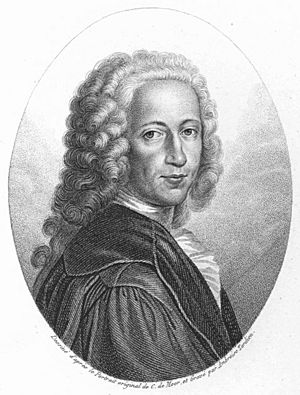Bernhard Siegfried Albinus facts for kids
Quick facts for kids
Bernhard Siegfried Albinus
|
|
|---|---|

Drawn after the original Portrait of Carel Isaak de Moor, and engraved by Ambroise Tardieu
|
|
| Born |
Bernhard Siegfried Weiss
24 February 1697 Frankfurt (Oder), Germany
|
| Died | 9 September 1770 (aged 73) Leiden, Netherlands
|
| Nationality | German |
| Education | Leiden University |
| Scientific career | |
| Fields | Anatomy |
| Institutions | Leiden University |
| Doctoral students | Gerard van Swieten |
Bernhard Siegfried Albinus (born Bernhard Siegfried Weiss; 24 February 1697 – 9 September 1770) was an important German-born Dutch anatomist. An anatomist is a scientist who studies the human body and how it works. He became a professor of medicine at Leiden University, just like his father. Albinus is famous for creating a beautiful book of human anatomy drawings with an artist named Jan Wandelaar.
Contents
Early Life and Education
Bernhard Siegfried Albinus was born in Frankfurt (Oder), Germany. His father, Bernhardus Albinus, was also a professor of medicine. In 1702, his family moved to Leiden, a city in the Netherlands.
Bernhard Siegfried started his studies at Leiden University when he was just 12 years old in 1709. He learned from famous teachers like Herman Boerhaave, a well-known doctor and scientist.
After finishing his studies in Leiden, Albinus traveled to Paris in 1718. There, he focused on learning more about anatomy and botany (the study of plants). He learned from other important scientists of the time.
Becoming a Professor
In 1719, Albinus was asked to return to Leiden University. He became a lecturer in anatomy and surgery. A lecturer is a teacher at a university.
Two years later, in 1721, he became a full professor. He took over the position from his father, who had passed away. Many students and doctors came to his classes to learn about the human body.
Albinus was a professor of anatomy for many years. In 1745, he also became a professor of the practice of medicine. His brother, Frederick Bernhard Albinus, took over his anatomy teaching role. Another brother, Christian Bernard Albinus, was also a respected scientist.
Bernhard Siegfried Albinus was chosen to be the head of his university twice. He passed away in Leiden.
His Famous Anatomy Book
Albinus is best known for his amazing book called Tabulae sceleti et musculorum corporis humani. This means "Tables of the Skeleton and Muscles of the Human Body." It was first published in Leiden in 1747.
He spent a lot of his own money to create this book. It had incredibly detailed and beautiful illustrations.
Working with Jan Wandelaar
The artist and engraver who drew almost all the pictures for Albinus's book was Jan Wandelaar. Wandelaar even lived in Albinus's house from 1746 until he died.
They came up with a new way to make their drawings very accurate. They used nets with square patterns placed between the artist and the body they were drawing. This helped them copy the images precisely.
The "Perfect Human" Idea
Albinus believed in the idea of a "homo perfectus," which means a "perfect human." He thought there was an ideal human body shape that all other humans were slightly different from.
To show this "perfect human," the drawings in his book were made from studying many different bodies. Earlier anatomy books often drew from only one body. Albinus liked to show athletic and slender body shapes in his illustrations.
The Rhinoceros in the Book
One of the most famous pictures in Albinus's book shows a human skeleton in front of a rhinoceros. This rhinoceros was named Clara. She was a very popular animal living in Leiden at the time.
Wandelaar drew this picture in 1742, even before the book was finished. It's a fun and unique detail in a serious anatomy book!
Images for kids
 | Lonnie Johnson |
 | Granville Woods |
 | Lewis Howard Latimer |
 | James West |


